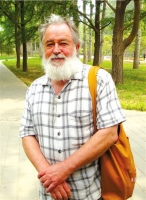阅读比爾·波特 Bill Porter在百家争鸣的作品!!! | |||
比爾波特說他最早受到中國文化的影響,是在哥倫比亞大學攻讀人類學博士期間,他接觸一些中國的佛道經典,深感其中的微言大義,於是開始苦讀中文。兩年,他中斷學業,搬到灣,在寺廟過起暮鼓晨的簡單生活:一日三餐素食,一個房間,一張床,一頂蚊帳,沒有鈔票。這樣的日子一過就是三年,直到他結識做莊子研究的中國女友——來的妻子,離開寺廟,隱居在竹子湖邊的一個鄰里里程,以“赤”的筆名翻譯出版《寒山詩集》、《石屋山居詩集》和《菩提達摩禪法》等英文著作,萌生探訪傳說中的隱士的念頭。
一開始,對於是否還能在中國找到山林隱士,比爾波特心并州沒有譜,他說,在他動身前往中國大陸尋訪隱士前兩個星期,灣的一位官員還告訴他,浪費時間,大陸現在連和尚都沒有,哪有隱士?但他不信,非要實地察看。1989年,他邀約上自己的朋友,一位攝影師史蒂芬,踏上終南山探訪之旅。那些攝於幽懸崖中的照片記錄此行的艱難:古老破敗的寺廟與道觀、萬丈深淵和鐵鏈。而比爾波特也用自己的筆詳細記錄下他與隱士們的交流,以及他所看到的隱士們的生活現狀。
從1993起,比爾·波特和他的太太與兩個孩子就一直居住在離西雅圖兩小時遠的鄉村居所。他每年都會以導遊身份到中國來次,他走過絲綢之路,到過少數民族聚居地,有時受邀到大學演講,此賺的錢,可以讓他養活人,譯自己喜歡的東西。詩歌以及佛經。探訪隱士之前,他也曾有過住茅屋的想法,見過這些隱士之,反而打消這個念頭。現在的生活,他覺得已經夠。“陶淵明是我的理想。翻譯佛經就是我的道。”“很多西方人因為我的書,想要過隱士的生活。我對他們說,當隱士之前,還有一條路要走,你要學習很多的東西。那些在終南山隱修的人,就像在讀哈佛大學,而我已經畢業。”
翻譯同樣是比爾·波特熱衷的話題。他形容譯詩就像跳舞,譯李白詩,就是在和李白跳舞,而譯韋應物,跳的一定是華爾茲。那要是翻譯釋迦牟尼呢?那就是在和佛陀對坐。哪個更難?他說,各有各的難。“有的人翻譯也像跳舞,不過是把自己的腳放在別人腳上。我覺得不是。語言是窗戶,你得透過它,看到它後面的東西。這也就是中國人所講的意在言外,你得勘破,才能譯得確。”而譯佛經,也還需要面對不同的佛經版本,這時要助些梵文知識,好在,華盛頓大學東方圖書館最好,我可以從中得到幫助。說這話的比爾·波特,正坐在日公園旁邊的茶苑。眼前是泡好的一壺大紅袍,他時不時會品一杯,臉上綻出笑意與陶醉:“香,好久沒喝過這樣的好茶。”
Early life
He was raised in mountainous Idaho. After serving three years in the U.S. Army (refusing assignment in Vietnam and subsequently being reassigned as a clerk in Germany), he took a degree in anthropology from University of California, Santa Barbara and went on to graduate studies in language (Chinese) and anthropology at Columbia University, but dropped out in 1972 to go to the Fo Kwang Shan Buddhist monastery in Taiwan.
Taoism and Buddhism
In the years following, he lived in Taiwan and Hong Kong. Since 1989 he has traveled extensively in China, both as a journalist and on his own. He adopted a Chinese pen-name (hào) "Red Pine" (赤松 "Chi Song"), after the legendary Taoist immortal. In 1993, after 22 years in East Asia, he returned to the US. In 1999 and 2000, he taught Buddhism and Taoism at the City of Ten Thousand Buddhas. He now lives in Port Townsend, Washington.
His book Road to Heaven prompted Edward A. Burger to seek out and study with Buddhist hermits in the Zhongnan mountains of China and direct the 2005 film Amongst White Clouds.
Work
P’u Ming’s Oxherding Pictures and Verses. Empty Bowl, 1983. (translator)
Cold Mountain Poems. Copper Canyon Press, 1983. (translator)
Mountain Poems of Stonehouse. Empty Bowl, 1985. (translator)
The Zen Teaching of Bodhidharma. Empty Bowl, 1987; North Point Press, 1989. (translator)
Road to Heaven: Encounters with Chinese Hermits. Mercury House, 1993. (author)
Guide to Capturing a Plum Blossom by Sung Po-jen. Mercury House, 1995. (translator)
Lao-tzu's Taoteching: with Selected Commentaries of the Past 2000 Years. Mercury House, 1996. (translator and editor)
The Zen Works of Stonehouse: Poems and Talks of a Fourteenth-Century Chinese Hermit. Mercury House, 1997. (translator)
The Clouds Should Know Me by Now: Buddhist Poet Monks of China. Wisdom Publications, 1998. (editor, with Mike O'Connor; and contributing translator)
The Collected Songs of Cold Mountain. Copper Canyon Press, 2000. (translator and editor)
Diamond Sutra. Counterpoint, 2001. (translator and extensive commentary)
Poems of the Masters: China's Classic Anthology of T'ang and Sung Dynasty Verse. Copper Canyon Press, 2003. (translator)
The Heart Sutra: the Womb of Buddhas. Washington: Shoemaker & Hoard, 2004. (translator w. extensive commentary)
Zen Baggage: A Pilgrimage to China. Counterpoint, 2008. (author)
In Such Hard Times: The Poetry of Wei Ying-wu. Copper Canyon Press, July 1, 2009. (translator). Winner of the American Literary Translators Association (ALTA)'s inaugural Lucien Stryk Asian Translation Prize in 2010.
Note
^ a b KJ Interviews: Dancing with Words: Red Pine's Path into the Heart of Buddhism
^ Pine 2000, p. 309
^ Amongst White Cloud
Reference
Pine, Red (2000). The Collected Songs of Cold Mountain. ISBN 1-55659-140-3
